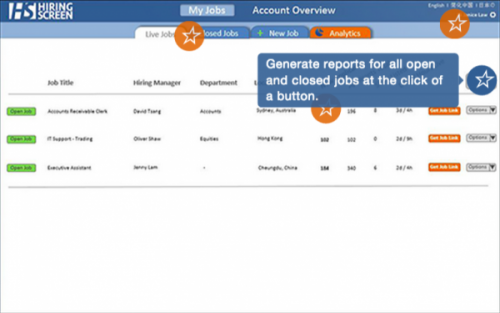Looking for your next Employee of the Year? Meet Hiring Screen
e27 chats with Founder and CEO Richard Hanson about raising US$800k, using Big Data to revitalise outdated HR practices in Hong Kong and more
The Hiring Screen family, CEO is pictured Richard Hanson second row, second from left.
For nearly seven years, when Richard Hanson was working as an HR consultant in Hong Kong, he dealt with a daily influx of applications numbering in the hundreds, with no simple way to sort through them.
That fodder and headache provided him the motivation to launch Hiring Screen.
“I searched online for a solution to streamline the application flow, rather than spending hours manually sorting,” says Hanson, CEO of Hiring Screen. They’re a SaaS startup that sorts and ranks applicable candidates using Big Data.
For each job launch round, applicants apply directly through Hiring Screen’s provided link. The applications are sorted, based on metrics set by the employer. The information is then presented in a standardised format. A full analytics dashboard provides access to key metrics and statistics.

Hanson, who hails from the UK, partnered up with friend and Co-founder Luke Bynre prior to applying for the blueprint accelerator programme.
“I actually met Luke when I recruited him for his previous job in Hong Kong,” laughs Hanson.
The team of eight recently closed US$800,000 in a fundraising round from undisclosed angel investors in Hong Kong and Europe, and is expecting to roll out a new version of Hiring Screen in January.
Each job launch – meaning each job position a company wants to fill – is priced at US$75 (HK$580), or can be purchased in a bundle. The interface is available in English, simplified and traditional Chinese.
Hanson chats with e27 about his experience and how the HR industry in China could benefit from tech-based solutions.
Here are the edited excerpts:
Do you think hiring someone can be reduced to an algorithm?
Hiring is all about the human touch, but time should be spent meeting the right people. We’re not trying to say the most relevant person is the one you should hire. It is just the narrowing down of the pool of people and having an organised system.
Is it a concern that people might alter their CVs in accordance to keywords, hoping to get ahead?
That would happen if someone starts an application process and his/her sole purpose is to lie. During the submission process, the programme asks direct questions as vetted by the employer to reduce this risk. Some employers, for instance, require Cantonese or a work visa. Hiring Screen will ask these questions again.
Something to emphasise though on the applicant side: We also provide the applicants with feedback or at least notification if they have not made the cut.
If 100 people are applying for one job, it is hard to give feedback. This is a big problem in Hong Kong. Recruitment might not have the ability to follow up with someone if he or she is not a good candidate for the job. If these candidates can receive feedback, it’ll make them feel engaged. This reflects well on the company.
Also Read: How Singapore is growing startups’ technologies through matchmaking
You worked in both Europe and Asia, how does your experience compare? What problems do you see in Hong Kong?
In the HR industry, Europe is ahead in Asia in terms of technology. Some recruiting teams in Hong Kong are still using Excel.
In Hong Kong, jobs in the retail, sales, hospitality, food & beverage, and manufacturing sectors have a high turnover. A new way of sorting applications is needed.
I went out and met with 30 heads of HR in different industries. Everybody had the same frustrations including me, as someone who worked in HR both in the UK and here.
The problem with recruitment agencies is that they are incentivised not by quality but by how fast they work.
This is the same problem with job boards, which as a business model are interested in the revenue they receive from the post, as opposed to attracting candidates to apply.
Hiring Screen successfully joined an accelerator programme. What tips do you have for other startups in Hong Kong looking to do the same?
We had a team before we got admitted to blueprint. Going into the accelerator programme gives you validation and boosts your credibility. It’s important to understand where you are in your startup journey before joining one. Do your homework on what you can achieve in an accelerator programme in Hong Kong.
For example, as a B2B tech startup, blueprint has great opportunities. If you’re doing hardware, check out Brinc.
Is your team planning to scale beyond Hong Kong in the future?
We want to prove ourselves first in Hong Kong. We definitely see Thailand and the Philippines as areas where people are increasingly on their mobile phones, especially when applying for jobs.
Also Read: Sydney’s Divvy Parking plans to drive into Hong Kong
The post Looking for your next Employee of the Year? Meet Hiring Screen appeared first on e27.


